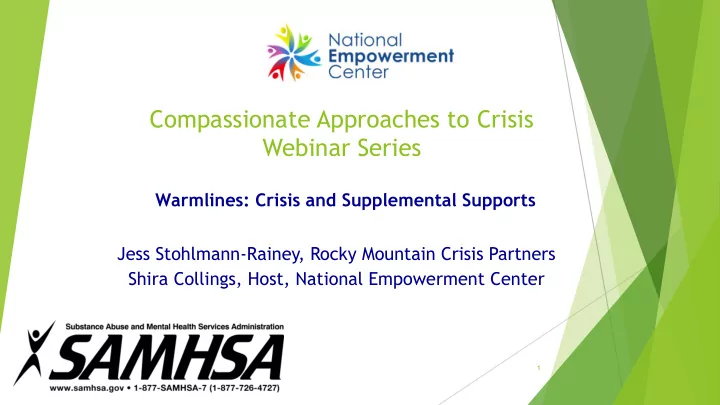

Compassionate Approaches to Crisis Webinar Series Warmlines: Crisis and Supplemental Supports Jess Stohlmann-Rainey, Rocky Mountain Crisis Partners Shira Collings, Host, National Empowerment Center 1
Disclaimer This webinar was developed [in part] under grant number SM062560 from the Substance Abuse and Mental Health Services Administration (SAMHSA), U.S. Department of Health and Human Services. The views, opinions, and content expressed in this presentation do not necessarily reflect the views, opinions, or policies of the Center for Mental Health Services (CMHS), the Substance Abuse and Mental Health Services Administration (SAMHSA), or the U.S. Department of Health and Human Services (HHS).
Archive This Webinar will be recorded. The PowerPoint presentation and the audio recording of the teleconference will be posted to the National Empowerment website at: http://www.power2u.org
Questions? At the end of the webinar, there will be a Q & A session. You are invited to ask questions at any time through the “question” function. Questions will be taken in the order they are received. You are also welcome to make comments using the “chat” function.
Warmlines Crisis & Supplemental Supports
Jess Stohlmann- Jess is a researcher, trainer, and activist serving as the Director of Program Development at Rocky Mountain Crisis Partners. She has Rainey focused her career on creating pathways to intersectional, justice- based, emotional support for marginalized communities. Jess centers her lived expertise as an ex-patient and suicide attempt survivor in her work. Her work has been featured in Mad in America, Radical Abolitionist, No Restraints with Rudy Caseres, Mental Illness Research, Education and Clinical Centers, Postvention in Action: The International Handbook of Suicide Bereavement, Crisis, and The Suicide Prevention Resource Center. She collaborates on a podcast called Suicide ‘n’ Stuff with Dese’Rae Stage from Live Through This. She holds the Lived Experience seat on Colorado’s Suicide Prevention Commission, and was the winner of the 2019 American Association of Suicidology Transforming Lived Experience Award, the 2019 Cookie Gant and Bill Compton LGBTQIA Leadership Award for Excellence in Promoting Diversity and Inclusion, and chairs the Paul G Quinnett Lived Experience Writing Competition. She lives with her partner (Jon) and a 16 year old chiweenie (Marty), and has a taxidermied two headed duckling (Phil & Lil) for an office mate.
What is a warmline? Offer peer support telephonically Frequently involve follow up or call May be peer run or integrated into back services clinical settings Generally do not have service level Often connected to face to face agreements regarding live answer or services call abandonment
Hotlines vs. Warmlines HOTLINES WARMLINES ● Usually connected with crisis and/or ● May use a voicemail/call back service suicide ● Typically not provide clinical screening ● Typically include screening and or assessments assessment ● May refer people in crisis to other ● Typically include active rescue policies services ● May not work with people pre/post- ● Typically work with people pre/post- crisis crisis
Hot vs. Warm Calls HOT CALLS WARM CALLS ● Suicidal or Homicidal Thoughts ● Existential or spiritual crisis ● Rape, Incest, or Assault ● Navigating services or systems ● Domestic Violence ● Pre/Post-crisis ● Child & Elder Abuse ● Leaving hospitalization or other ● Grave Disability treatment ● Needing community or support
Peer Run ● Autonomously run by peer/recovery support service organizations Warmlines ● Typically do not have clinical oversight or protocols ● May refer to independent crisis services ● Often operate outside of the formal mental health service system ● Support peer values ● Often struggle with funding
Clinically Embedded ● Delivered alongside, in conjunction with, or secondary to other crisis Warmlines services ● May include screening or other clinical protocols ● Often connected to a series of other clinical interventions ● Often considered a powerful addition to clinical intervention ● More risk of compromising peer values ● Less struggle with funding because of the equipment and space sharing with clinical interventions
Funding 1. Medicaid Billing 2. Community Support 3. Foundation Support 4. Government Support
Technology, Data, & Pros & Cons of Documentation Documentati Web Based vs Traditional Phone Systems on Recording Calls Online Emotional Support Dispatching Services
Evidence Base
Training Staff Volunteers vs paid staff Choices about certification
Questions ?
Email: Jess@RMCrisisPartners.org Get In Touch Twitter: @JessStohlmann Websites: Jess Stohlmann-Rainey SolutionsByJess.com Director of Program Suicide-n-Stuff.com Development IHurtMyselfToday.com Rocky Mountain Crisis Partners Consultant Solutions by Jess
Contact Us 1-800-POWER2U (800-769-3728) info4@power2u.org www.power2u.org
Recommend
More recommend